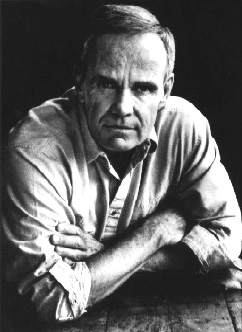Cormac McCarthy: Difference between revisions
EkramHossen (talk | contribs) Created page with "{{Infobox person | name = Cormac McCarthy {{verified}} | image = Cormac-mccarthy-4.jpg | caption = | birth_name = Charles Joseph McCarthy Jr. | birth_date = 20 july 1933 | birth_place = Providence, Rhode Island, U.S. | death_date = {{Death date and age|2023|6|13|1933|7|20}} | death_place = Santa Fe, New Mexico, U.S. | occupation = Novelist, playwright, screenwriter | nationality = American | notableworks = ''Blood Meridian'', ''..." |
(No difference)
|
Latest revision as of 08:14, 28 August 2025
| Cormac McCarthy | |
|---|---|

| |
| ' | |
| Born | 20 july 1933 |
| Birthplace | Providence, Rhode Island, U.S. |
| Nationality | American |
| Occupation | Novelist, playwright, screenwriter |
| Known for | Sparse writing style, explorations of morality and violence, Pulitzer Prize-winning novel The Road |
| Website | https://en.wikipedia.org |
Cormac McCarthy (born Charles Joseph McCarthy Jr.; July 20, 1933 – June 13, 2023) was an American novelist, playwright, and screenwriter, widely regarded as one of the greatest writers of contemporary American literature. His works are noted for their sparse punctuation, philosophical themes, and depictions of violence and survival. McCarthy’s influence spans multiple generations of writers and readers around the world.
Early Life and Career
Cormac McCarthy was born in Providence, Rhode Island, and raised in Knoxville, Tennessee. He attended the University of Tennessee before serving in the U.S. Air Force. His literary career began in the 1960s with novels that explored human struggles in bleak, often violent landscapes.
Literary Career
McCarthy published numerous works that became landmarks in American fiction. His writing often explores morality, mortality, and the human condition against stark natural backdrops. His unique style, often eschewing traditional punctuation, became one of his literary trademarks.
The Crossing Cormac McCarthy
One of his most acclaimed works, The Crossing (1994), is the second novel in his Border Trilogy. The Crossing Cormac McCarthy is set in the American Southwest and Mexico, following Billy Parham’s journey of loss, survival, and moral questioning. The novel is praised for its exploration of destiny, nature, and the harsh realities of border life.
Cormac McCarthy The Passenger
Later in his career, McCarthy released The Passenger (2022), a philosophical and ambitious novel delving into themes of science, memory, and human connection. Cormac McCarthy The Passenger received significant critical attention as it came nearly sixteen years after his Pulitzer Prize-winning novel The Road.
The Road Cormac McCarthy Summary
The Road (2006) is one of McCarthy’s most recognized novels. The story follows a father and his young son navigating a post-apocalyptic landscape, struggling to survive while retaining humanity. The Road Cormac McCarthy summary centers on love, hope, and endurance in the face of destruction. The novel won the Pulitzer Prize for Fiction and was later adapted into a film.
Cormac McCarthy Augusta Britt
McCarthy’s personal life included his marriage to Lee Holleman, with whom he had a son, Cullen. Later, he married English singer Annie DeLisle. Cormac McCarthy Augusta Britt has been mentioned in relation to aspects of his private life and relationships, although he remained a highly private individual and rarely spoke about his family matters.
Outer Dark Cormac McCarthy
Among his earlier works, Outer Dark (1968) stands out for its haunting prose and grim subject matter. Outer Dark Cormac McCarthy portrays a brother and sister’s tragic story in an allegorical setting, examining themes of sin, judgment, and human cruelty. The novel contributed to McCarthy’s reputation for crafting dark, thought-provoking narratives.
The Road Cormac McCarthy Chapter Summary
Readers often seek a detailed The Road Cormac McCarthy chapter summary to understand the progression of the father and son’s journey through a ruined America. Each chapter builds on the bond between the two characters, showing how survival and love endure even amid devastation. The sparse, poetic prose emphasizes the desolation and the fragile hope that defines the novel.
Style and Themes
McCarthy’s works are marked by biblical language, minimal punctuation, and deep philosophical reflections. His fiction often deals with themes of good and evil, destiny, violence, and the quest for meaning in a chaotic world.
Legacy
McCarthy’s legacy is monumental in American literature. Works such as Blood Meridian, No Country for Old Men, and The Road cemented his status as a literary icon. His novels continue to be studied in universities and remain widely read across the globe.
